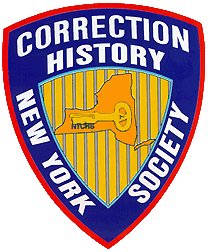
By Schenectady Sheriff Harry C. Buffardi
© 1998. The History of the Office of Sheriff was published and copyrighted in 1998 by Schenectady County Sheriff Harry C. Buffardi.
 |
By Schenectady Sheriff Harry C. Buffardi© 1998. The History of the Office of Sheriff was published and copyrighted in 1998 by Schenectady County Sheriff Harry C. Buffardi. |  |
NYCHS posts
|
|
....The period of time known as the "Wild West" was from about 1835 until 1895, and the area for which it identifies was roughly the land west of the Mississippi River..... The Louisiana Purchase of 1803 almost doubled the size of the country and there was no shortage of settlers heading toward the setting sun. Many attitudes and principles accompanied these migrants. Rugged individualism, conquest, progress, free enterprise, the right to bear arms, and law and order principles reinforced American ideals. The sheriff was a major player in these processes.
Land, gold, and other economic incentives were part of the lure. Transportation availability such as trails, roads, canals, river boats, horse drawn vehicles, and later trains aided in the movement of people and their possessions. . . . Fertile soil, abundant game, and lack of restrictions constituted the stuff of dreams. . . . Dime novels and other accounts of the Wild West were sometimes based upon fantasy, or at least exaggerations of the truth. However, what people perceive as the truth may be just as important as the actual truth itself. The associated violence, or the enhanced versions of violence, have added to the mystique. At the center of much of the romanticized versions of the era was the Western sheriff. Social misfits who had failed for various reasons in the East followed the allure of the West and all its attractions. Thus, the West became a refuge for the potentially violent and lawless.... The heterogeneous population in the territories required a local control to deal with the complex issues of turbulence and crime. This was all very much like the need for local controls in government form that were needed in medieval England and Colonial America. As a result the office of sheriff was a ready-made entity to deal with the issues of crime on a local level. The idea that a position of this nature could be elected gave it an added dimension. It could reflect the needs of the community, and the citizens could have a direct input into the process of law and order by virtue of their vote.... The early settlements of the West were small and isolated and usually exhibited a reasonable amount of peace and order. The majority of the settlers came to build a new life in the West, and crime was not their original intent. A stranger was considered honest until proven otherwise and it was taken for granted that any traveler stopping by was welcome to stay for food and lodging. Locks symbolized an impeachment of public honesty and integrity and frontier people frequently did not secure their homes and businesses. Similarly, a man's word was his bond and the owners of various mercantile enterprises sold on credit and advanced merchandise without collateral. Some customers rode hundreds of miles to settle accounts as soon as they had money. If a fellow citizen violated a community standard, banishment became a popular form of settling the issue. General indignation or scorn from a community was a powerful weapon against violators of good order. If reformation of an offense could not be made the perpetrator was "hated out" by the fellow members of the community and forced to leave or face uncomfortable circumstances. As a place of wild lawlessness, the frontier's reputation was largely over-exaggerated. In reality, the West did not attract extreme numbers of lawless deviants and most settlers were friendly, hard working, and just. . . .However, violence and crime were dramatically in existence during this period and sheriffs were an important part of crime fighting matters in the nineteenth century West. |
 |
|  |
|